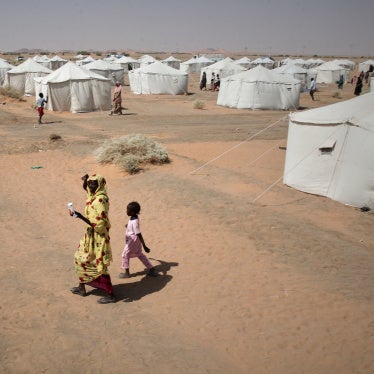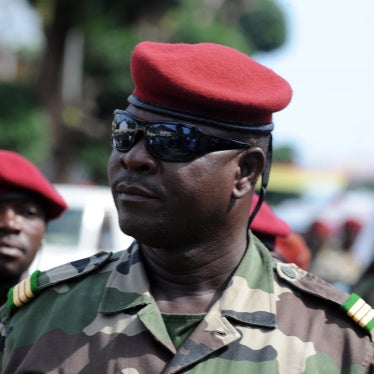In a letter addressed to the United Nations Secretary-General Kofi Annan and released publicly today, Human Rights Watch is calling for the establishment of a war crimes commission to investigate the alleged atrocities committed in the course of the military offensive in Zaire (now the Democratic Republic of Congo). A new UN report on the human rights situation in Congo/Zaire, submitted to the General Assembly by the joint investigative mission of the Commission on Human Rights, found that some of the alleged massacres could constitute acts of genocide. It also concluded that "there are reliable indications that persons belonging to one or other of the parties to the conflict...probably committed serious violations of international humanitarian law, particularly article 3 common to the four Geneva Conventions of 1949" and that "[s]uch crimes seem to be sufficiently massive and systematic to be characterized as crimes against humanity." Such crimes, the report suggested, may be appropriate for prosecution by an international criminal tribunal, such as those created for the former Yugoslavia and for Rwanda. "Given the seriousness of these findings, it is imperative that the U.N. conduct an investigation that could constitute the first step toward criminal prosecution of those responsible for these crimes," said Kenneth Roth, Executive Director of Human Rights Watch. "Furthermore, the creation of a war crimes commission would be a clear signal that the U.N. is not abandoning the team established by the U.N. Human Rights Commission. By elevating the stature of the investigation, the U.N. can also show its determination not to make concessions in the face of the objections by an abusive government to the composition of the team."
The July 14 letter by Human Rights Watch recommended that in light of the findings of the report of the joint investigative mission, the Secretary-General request the Security Council to authorize immediately the creation of a Commission of Experts with the explicit mandate not only to investigate the alleged atrocities but also to determine whether the creation of an international tribunal is warranted.
A copy of the letter is attached.
July 14, 1997
Secretary-General Kofi Annan
United Nations Headquarters
New York, NY 10017
By Hand
Dear Mr. Secretary-General:
We write to convey once again Human Rights Watch's serious concerns about how the United Nations has responded to objections by the Democratic Republic of Congo to the U.N.'s investigation of alleged atrocities in eastern Congo. In addition, in light of the newly released report of the joint mission conducting an initial part of that investigation, we offer recommendations for overcoming these objections in a manner that ensures the integrity of the U.N. human rights machinery.
As we have expressed repeatedly, Human Rights Watch fears that permitting the government charged with abuses to exclude Roberto Garretón, a top-notch and highly experienced human rights rapporteur, from the investigation will assuredly encourage other accused governments to attempt similar maneuvres to hinder effective inquiry. It will also encourage self-censorship among other U.N. rapporteurs. Mr. Garretón published a preliminary report in an effort to save lives while massacres were underway, a procedure followed previously by the Special Rapporteur for Rwanda, who issued a similar report during the Rwandan genocide. Rather than encourage such a laudable preventive initiative, which was found to be completely justified during killings in 1994, the U.N. now appears to be censuring an attempt to halt ongoing slaughter.
The recommendation by the joint mission, in its report released on July 11 (A/51/942), that the Security Council create a standing commission of experts offers an opportunity to deal with the objections of the Congolese government while at the same time ensuring an effective investigation.
The report states (para. 80) that some of the alleged massacres could constitute acts of genocide. It also concludes (para. 95) that "there are reliable indications that persons belonging to one or other of the parties to the conflict . . . probably committed serious violations of international humanitarian law, particularly article 3 common to the four Geneva Conventions of 1949" and that "[s]uch crimes seem to be sufficiently massive and systematic to be characterized as crimes against humanity." Such crimes, the report suggests, may be appropriate for prosecution by an international criminal tribunal, such as those created for the former Yugoslavia and for Rwanda.
In light of these findings, Human Rights Watch respectfully calls on you to request the Security Council to authorize immediately the creation of a Commission of Experts with the explicit mandate not only to investigate the alleged atrocities but also to determine whether the creation of an international tribunal is warranted. The commission should be composed of human rights professionals with experience in investigating war crimes and crimes against humanity. It should be authorized to maintain full-time investigators in the region for as long as it deems necessary to fulfill its mandate. The commission should be required to publish periodic, public reports and to work closely with other relevant agencies of the U.N., including those created by the Commission on Human Rights.
Should the Security Council decline to act, you should act on your own authority to establish a commission of investigation of similar stature and mandate. Such a commission, whether established by the Security Council or by the Secretary-General, must not be taken as a substitute for the joint mission of the U.N. Human Rights Commission. It must be seen as elevating the stature of the investigation because of the seriousness of the charges, not as rewarding an accused government for hindering investigation of the allegations. To this end, it is imperative that you also continue to press for the free access of the joint mission of the Human Rights Commission to Congo. Otherwise, other governments that are accused of abuses in the future will have available an unfortunate precedent to hide their apparent crimes from public scrutiny.
Thank you for your kind attention to these matters.
Sincerely,
Kenneth Roth
Executive Director
Joanna Weschler
U.N. Representative
cc: Members of the Security Council
President Mary Robinson








